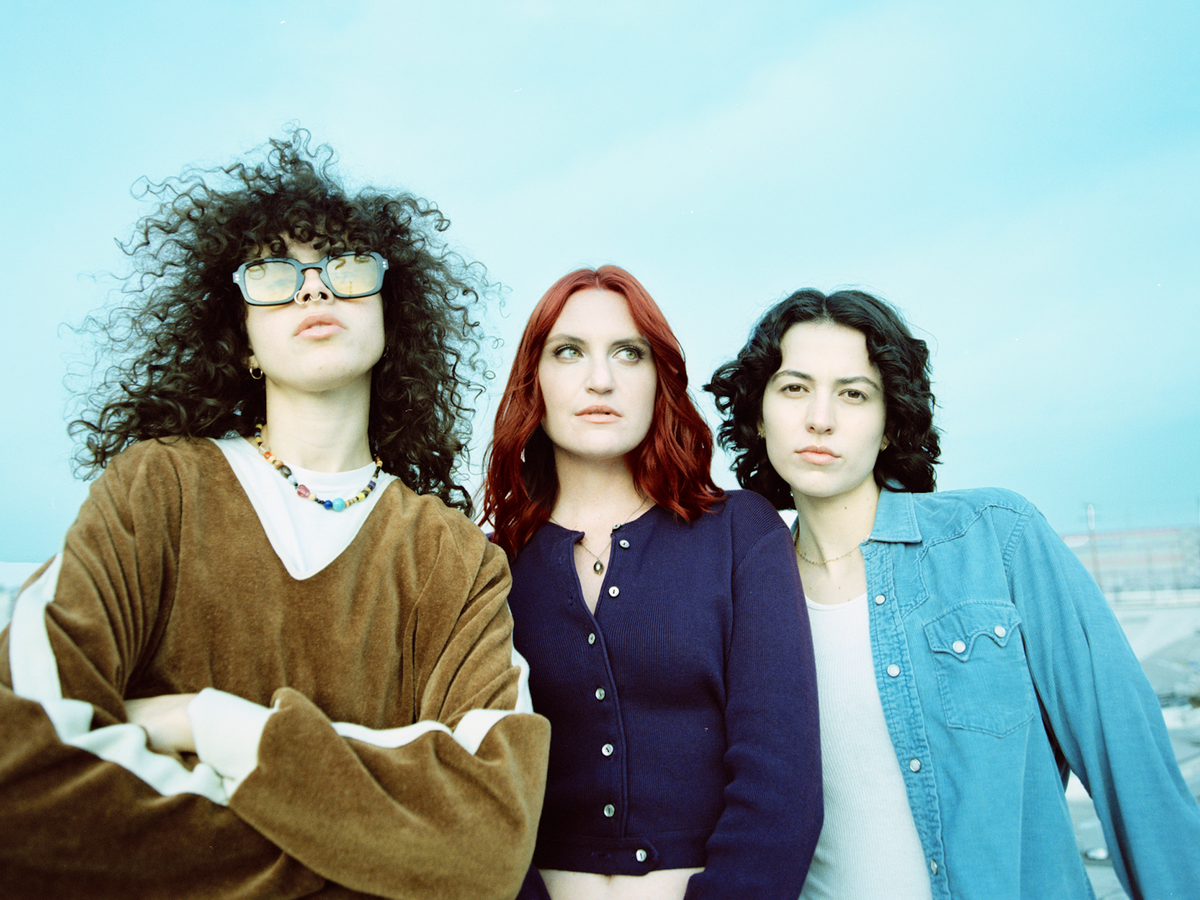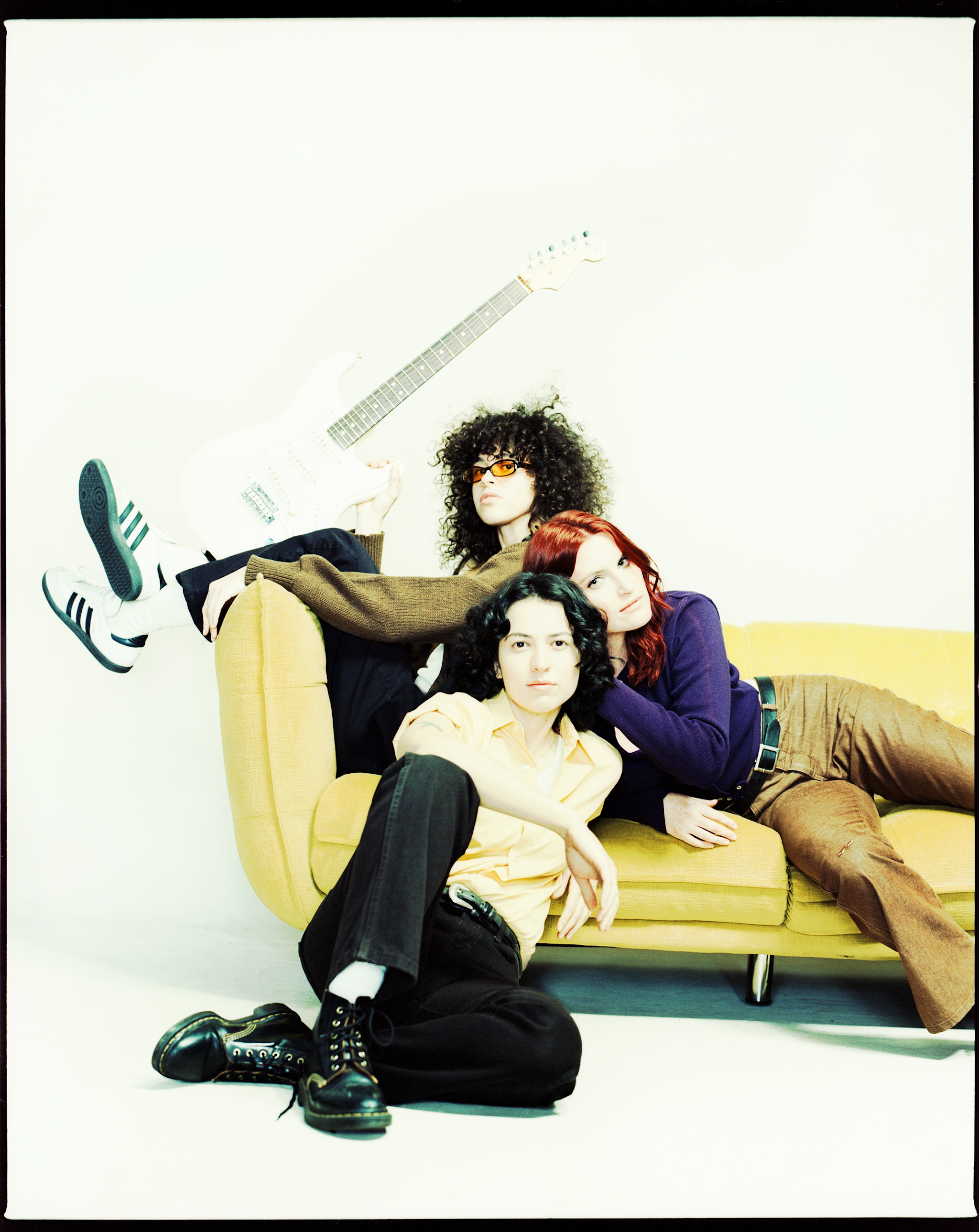
One-third of MUNA is running late. “We’ll do what we can without her,” jokes Naomi McPherson with fellow guitarist Josette Maskin. “And when Katie gets here, she can say something smart.” As if on cue, lead singer Katie Gavin strolls in, a supernova of red hair – on its fifth day of dry shampoo, she later tells me – that’s hard to miss in the dim lighting of The Hoxton hotel lobby. The three beam at each other: a look of love that feels more reminiscent of long-lost pals than it is friends who have spent the better part of the past 10 years joined at the hip, making hit albums and playing sold-out shows around the world.
MUNA never tire of one another. And if their growing popularity is anything to go by, neither do listeners. In the years since releasing 2017’s shimmering synth-pop debut About U, MUNA have become a benchmark for queer music, pop music and just music full stop. Their sound – bubbly, spiky and soft all at once – calls to mind Robyn in the way it summons affairs of the heart to the dance floor. Often, a sapphic energy will wrap around a MUNA track like a hot pink feather boa pulling you closer. It’s certainly true of their biggest song to date, “Silk Chiffon”. Last year’s hit collaboration with Phoebe Bridgers is the closest that MUNA have been to infiltrating the mainstream. Tours alongside Harry Styles, Kacey Musgraves, and King Princess have come close, too. Now, the group are gearing up to release MUNA, their third full-length album and first since getting dropped by their label and subsequently being signed to Bridgers’ indie imprint Saddest Factory Records.
Admittedly, there’s no good time to be dropped by your label but mid-pandemic feels especially brutal. In early 2021, MUNA were let go by RCA Records, home to Britney Spears and Alicia Keys. Today, as they chow down on a Mexican feast (“Sorry, your recording is literally going to be the sound of us just shoving our holes”), the band explain how they processed the news differently from one another. “I think I have the most good girl in me,” says Gavin. “I want to make people proud, so to be dropped was like, ‘Oh, I must not have done a good enough job.” For McPherson and Maskin, it only fuelled their ambitions. It gave the group a rare moment to sit still. They checked in with one another – as well as themselves – and asked if music was still something they wanted to pursue; if they still wanted to be MUNA. “It was like renewing our vows,” recalls Maskin. “The thing is, MUNA is this guiding force outside the three of us.” Realising how new-agey she sounds, Maskin seizes the opportunity for a joke and takes on the voice of a creepy cult leader, “Whatever needs to happen, MUNA will guide the way.” Without missing a beat, McPherson joins in. “MUNA is actually a god we dreamt up. We pray to it and make sacrifices.” Gavin is up next. “It’s an exclusive secret society where all we do is watch The Notebook and kiss.” They dissolve into a three-part harmony of hysterics.
Speaking with MUNA often follows this path. Conversations are regularly run off the road with a dry quip from one bandmate, prompting the other two to pile on in a heap of inside jokes and laughter. The timing and the telepathy is an art-form the trio have been perfecting since they met at college aged 20-ish in California. “Going through things that suck with your best friends means you can laugh about it,” Gavin says. “We want to have fun!”
On their new album, they’re having tons of it. Songs follows the ethos of “Silk Chiffon” – euphoric but vulnerable, freewheeling but immaculately constructed. It’s MUNA at their most assured. And perhaps their happiest? “I think so…” ventures Maskin who looks to her bandmates for confirmation. The truth is, they’re still working it out. “We let the songs dictate the flow and we figure out what it means afterwards. That’s life, right?” adds McPherson. But long-time fans have already deemed this latest release to be MUNA’s happy era. They’re happy to oblige.
On “What I Want”, Gavin’s voice floats in: “I want to dance in the middle of a gay bar / There’s nothing wrong with what I want.” It’s unabashed and unapologetic, just as we’ve come to expect from MUNA. “It’s been a long and winding road with my sexuality. I was raised Irish Catholic and I think it also has to do with me being femme and passing that made me really confused for a long time,” says Gavin, the band’s primary songwriter. “That song is very much an adult coming out. It’s me saying, ‘I really am gay and I’m quite horny too.’” Another track “No Idea” – co-written with Mitski, with whom Gavin now exchanges text messages about gardening – radiates lust in its electric guitar riffs and giddy come-ons delivered with off-the-chart sass.
Queerness is commodifiable in music but not to our benefit
Being queer is political, even when you don’t want it to be – a fact that MUNA were forced to reckon with before their careers had even begun. “Jo and I initially didn’t want to be labelled as a queer pop band,” recalls McPherson. “Even though yes, ultimately, we’re very gay. I mean, look at us,” they laugh, gesturing to Maskin who is dressed in chic baggy attire similar to their own. “I remember you both being concerned about people not paying attention to the music,” says Gavin, to which McPherson replies: “Yeah, I wanted us to be taken seriously. Even now sometimes the headline about us is just like ‘Queer pop band’... we get hit up in June for Pride a lot.” An eye-roll surfs around the table like a Mexican wave. “And queer or not, we’re making music that’s like… smoking hot”. Maskin and Gavin crack up at their word choice. “Naomi is obviously not the lyricist of MUNA.”
The commodification of their identities is something MUNA have thought about a lot. “People see it as a business benefit to work with queer artists now and yeah sure, it’s commodifiable but at the same time…” they struggle to find the words. McPherson taps out and Gavin taps in: “It’s commodifiable, but not to our benefit. It’s to somebody else’s benefit – some cis white guy head of a corporation.” It was only recently that McPherson announced that they go by they/them pronouns, an experience that brought on a panic attack in the middle of the Abba museum in Stockholm. “It’s pretty gnarly,” they say. “It’s like, you’re going to be invalidated a hundred times a day and that f***ing sucks. You need to have a thick skin about it. But it can lead to this outside hypervigilant paranoia that ruins my vibe so I really try not to think about it too much.”
Don’t get them wrong, MUNA of all people know how life-affirming visibility and representation is. It’s why they’re glad they decided to be out as a band. “It would have changed my life for me to see a band like us growing up,,” says McPherson. “But we need to be honest about what that visibility actually is, beyond just the image and text underneath it. We can’t hide away from that nuance.”

The fact that Gavin, McPherson and Maskin are all queer continues to be a cornerstone in their friendship. “Just like with any marginalised identity, there’s something easier about being around people who have a shared experience. It’s less likely that your labour or ideas are going to be overlooked. I love the fact that we each take the other so seriously and that we all think of one another as –” Gavin stops short and looks up because McPherson and Maskin have started cackling at something unknown. Maskin flashes us a demented smile, a black bean paste smushed against her gums and teeth. Gavin turns back to me, “Well, I was going to say we all think of each other as geniuses!”
Later that night, MUNA play to a rapturous crowd at Rough Trade East. Even in a small venue, fans make space for one another to dance, sing and embrace. Lyrics are shouted and matched word for word. At times, it’s easy to forget how radical it still is to feel a part of this pure queer joy. A MUNA gig is a good reminder.
MUNA will be released by Saddest Factory Records on Friday 24 June







